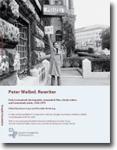 |
|
|||||||||||||||||||||||||||||||||||||||||||||||||||||||||||||
Peter Weibel is a fascinating artist whose career extends from the late 1960s to the present. He is not, however, the cultural saboteur (much less terrorist) art critics make him out to be. Osvaldo Romberg, who curated the show of Weibel's early works upon which this DVD is based, claims that Weibel's work reflects "the strategies of the Tupamaros, a Latin American group active in Uruguay in the 1960s. This group operated not through fear [as terrorists, by literal definition of the word, would] but by exposing secret bank accounts, money laundering schemes, and other economic transgressions. In this way, the Uruguayan public was made aware of the corruption that pervaded their country." Artists have, on rare occasion, made the public aware of the need for change (Upton Sinclair comes to mind in this regard), but Weibel is certainly not among them. But far be it from art critics to let reality restrain their hubris or deter them from making grander-than-thou claims for Art. Christa Steinle, in her essay "A Heretic of the Art System," claims that Weibel forced art lovers to trample on the law when he wrote the words "trampling on the law" on a gallery floor in Krems in 1968. If there's danger of trampling here, it's as we roll on the floor laughing at the hubris of this ludicrous assertion. Alas, the problem with the presentation of art, at least for the past hundred or so years, is that curators and critics get to do the presenting. The art-curious should take it as a given that, after opening their copy of Peter Weibel, Rewriter Steinle's essay begins with a dismissive paragraph that runs through the barest sketch of Weibel's biography, as if that were the least important thing someone might wonder about in the case of this obscure Russian-Austrian artist. In fact, just the opposite is the case: the 22-page booklet that comes with the DVD provides just about zero context, historical or otherwise, the very thing that might have been helpful for placing Weibel in a broader context of confrontational art. Instead, we get a mass of words that, like the above, bares little if any connection with reality. Where the Tupamaros helped restore democracy in Uruguay, Weibel played to tiny groups of well-heeled art patrons who could afford and were entertained by the illusion of disaffection - just as long as the status quo wasn't really upset. When the Tupamaros' work was done, some of its members joined the government in order to continue working for the people. Weibel, after deciding his work as an artist was done, went on to be an art professor in Nova Scotia and a gallery curator in Europe. So what is this DVD good for? We get Weibel being led around on a dog chain through the streets of Vienna by his partner, Valie Export. We get Weibel reading a poem, one phoneme at a time, into a tape recorder and the tape recorder playing the poem back backwards, one phoneme at a time ("Soliloquy," 16 minutes and 35 seconds). Weibel was good at turning the camera on himself and doing things that were pretty much assured of pissing off fine artists - he made an art of the question, But is it art? He eschewed a polished finish (an aesthetic, as the art critics would say) and didn't use the materials of fine art. This DVD doesn't have much of an aesthetic, either, though, as the transfer from film is flawed throughout - little electronic glitches ripple through the images from the very beginning of the DVD and distort almost every chapter. Rewriter The other thing this DVD is good for is as a history of the failure of art of the haute culture to do any damn good at all when it comes to confronting mainstream culture. Peter Weibel, contrary to the outré claims of the essayists herein, neither invoked fear not controversy (expect, again, among the demi monde of the haute culture) but rather left no discernable trace outside the world of high art. Peter Weibel should be contrasted with other, more memorable, theatrical attempts at artistic confrontation, e.g., the San Francisco Mime Troupe, the Bread and Puppet Theater, or Julian Beck, Judith Molina and others involved in The Living Theatre, all of whom, with Weibel, share the influence of Antonin Artaud and his theory of a theatre of cruelty. Weibel got at least a few things right - or at least offered hope for idealists longing to make a difference through the practice of art. Here's one of them: "Art history is a collective fiction... written wrongly, but always attempted to be rewritten correctly." Good luck with that. |
|
|||||||||||||||||||||||||||||||||||||||||||||||||||||||||||||
|
||||||||||||||||||||||||||||||||||||||||||||||||||||||||||||||
| action | animation | art house/international | comedy | documentary | drama | family | horror/sci-fi | suspense | television | ||||||||||||||||||||||||||||||||||||||||||||||||||||||||||||||
| contact | home | ||||||||||||||||||||||||||||||||||||||||||||||||||||||||||||||


